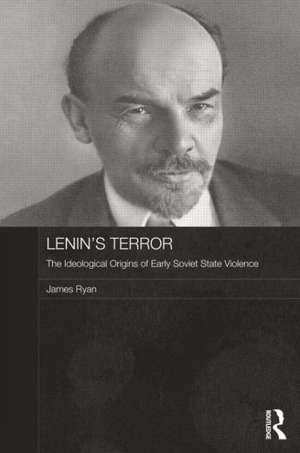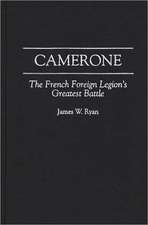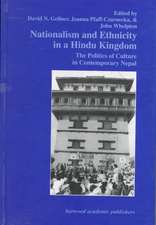Lenin's Terror: The Ideological Origins of Early Soviet State Violence: Routledge Contemporary Russia and Eastern Europe Series
Autor James Ryanen Limba Engleză Paperback – 4 iul 2014
| Toate formatele și edițiile | Preț | Express |
|---|---|---|
| Paperback (1) | 487.37 lei 6-8 săpt. | |
| Taylor & Francis – 4 iul 2014 | 487.37 lei 6-8 săpt. | |
| Hardback (1) | 1221.74 lei 6-8 săpt. | |
| Taylor & Francis – 31 mai 2012 | 1221.74 lei 6-8 săpt. |
Din seria Routledge Contemporary Russia and Eastern Europe Series
-
 Preț: 309.79 lei
Preț: 309.79 lei -
 Preț: 326.49 lei
Preț: 326.49 lei -
 Preț: 326.15 lei
Preț: 326.15 lei - 9%
 Preț: 1010.71 lei
Preț: 1010.71 lei -
 Preț: 321.03 lei
Preț: 321.03 lei -
 Preț: 302.33 lei
Preț: 302.33 lei -
 Preț: 325.21 lei
Preț: 325.21 lei - 9%
 Preț: 934.70 lei
Preț: 934.70 lei -
 Preț: 318.10 lei
Preț: 318.10 lei -
 Preț: 379.30 lei
Preț: 379.30 lei - 18%
 Preț: 1111.51 lei
Preț: 1111.51 lei - 18%
 Preț: 1058.79 lei
Preț: 1058.79 lei - 25%
 Preț: 824.70 lei
Preț: 824.70 lei -
 Preț: 464.54 lei
Preț: 464.54 lei - 18%
 Preț: 950.71 lei
Preț: 950.71 lei - 18%
 Preț: 1168.76 lei
Preț: 1168.76 lei - 24%
 Preț: 130.54 lei
Preț: 130.54 lei - 26%
 Preț: 821.46 lei
Preț: 821.46 lei - 18%
 Preț: 1169.78 lei
Preț: 1169.78 lei -
 Preț: 413.98 lei
Preț: 413.98 lei -
 Preț: 387.49 lei
Preț: 387.49 lei -
 Preț: 406.52 lei
Preț: 406.52 lei - 18%
 Preț: 1059.93 lei
Preț: 1059.93 lei - 18%
 Preț: 1218.26 lei
Preț: 1218.26 lei -
 Preț: 418.13 lei
Preț: 418.13 lei - 18%
 Preț: 1171.89 lei
Preț: 1171.89 lei - 18%
 Preț: 1057.57 lei
Preț: 1057.57 lei -
 Preț: 413.37 lei
Preț: 413.37 lei - 18%
 Preț: 707.96 lei
Preț: 707.96 lei - 18%
 Preț: 1058.65 lei
Preț: 1058.65 lei - 18%
 Preț: 948.84 lei
Preț: 948.84 lei - 18%
 Preț: 706.91 lei
Preț: 706.91 lei - 18%
 Preț: 1059.84 lei
Preț: 1059.84 lei -
 Preț: 488.33 lei
Preț: 488.33 lei - 18%
 Preț: 1056.28 lei
Preț: 1056.28 lei -
 Preț: 390.12 lei
Preț: 390.12 lei - 18%
 Preț: 1053.16 lei
Preț: 1053.16 lei - 18%
 Preț: 1056.28 lei
Preț: 1056.28 lei - 28%
 Preț: 850.91 lei
Preț: 850.91 lei - 18%
 Preț: 1050.78 lei
Preț: 1050.78 lei - 18%
 Preț: 1166.68 lei
Preț: 1166.68 lei - 18%
 Preț: 1058.79 lei
Preț: 1058.79 lei - 18%
 Preț: 1958.23 lei
Preț: 1958.23 lei - 18%
 Preț: 1221.74 lei
Preț: 1221.74 lei
Preț: 487.37 lei
Nou
Puncte Express: 731
Preț estimativ în valută:
93.26€ • 99.73$ • 77.76£
93.26€ • 99.73$ • 77.76£
Carte tipărită la comandă
Livrare economică 17 aprilie-01 mai
Preluare comenzi: 021 569.72.76
Specificații
ISBN-13: 9781138815681
ISBN-10: 1138815683
Pagini: 284
Ilustrații: black & white illustrations
Dimensiuni: 156 x 234 x 22 mm
Greutate: 0.41 kg
Ediția:1
Editura: Taylor & Francis
Colecția Routledge
Seria Routledge Contemporary Russia and Eastern Europe Series
Locul publicării:Oxford, United Kingdom
ISBN-10: 1138815683
Pagini: 284
Ilustrații: black & white illustrations
Dimensiuni: 156 x 234 x 22 mm
Greutate: 0.41 kg
Ediția:1
Editura: Taylor & Francis
Colecția Routledge
Seria Routledge Contemporary Russia and Eastern Europe Series
Locul publicării:Oxford, United Kingdom
Public țintă
PostgraduateCuprins
Introduction: Ideology and Terror 1. ‘Revolution is War’: The Genesis of a Militant Marxism, 1894-1907 2. ‘Violence to end all violence’: Ideological Purity and the Great War, 1907-1917 3. ‘History will never forgive us if we do not seize power now’. The Revolutionary Imperative, 1917 4. Confronting the ‘Wolves in the Forest’: October 1917-Summer 1918 5. The Red Terror 6. Civil War: The Strengthening of Dictatorship, 1919-21 7. War and Peace: From Civil War to NEP, 1919-1921 8. ‘We will cleanse Russia for a long time’: The Contradictions of NEP Conclusion: Lenin's Terror
Notă biografică
James Ryan is a Government of Ireland Postdoctoral CARA Mobility Research Fellow in the Humanities and Social Sciences, based at the Department of History, University of Warwick, UK and School of History, University College Cork, Ireland.
Recenzii
"Ryan's important book offers an excellent account of Leninism as a revolutionary doctrince that sanctifies political violence and condemns entire social categories to state-engineered extinction. Masquerading as an ideology of the oppressed, it was a secular teleology of exclusion rooted in the visceral contempt for the rule of law, liberty, property and the universality of human rights." - Vladimir Tismaneanu, University of Maryland
"Lenin’s Terror off ers a chronological narrative of Lenin’s relationship with violence from the 1890s to the 1920s, and this makes it a real contribution to the historiography—both in terms of enabling further evaluations of the infl uence of Leninism on Stalinism as well as in its own right. For scholars of political violence, to wit, it is decidedly benefi cial to fi nd contained in one volume a comprehensive overview of Lenin’s take on terror, revolution, war, and dictatorship, especially because for Lenin, depending on the circumstances, violence understood as terrorism, for example, could be properly rethought—and legitimized—as partisan or civil war." - Claudia Verhoeven, Cornell University, Slavic Review
"Lenin’s Terror off ers a chronological narrative of Lenin’s relationship with violence from the 1890s to the 1920s, and this makes it a real contribution to the historiography—both in terms of enabling further evaluations of the infl uence of Leninism on Stalinism as well as in its own right. For scholars of political violence, to wit, it is decidedly benefi cial to fi nd contained in one volume a comprehensive overview of Lenin’s take on terror, revolution, war, and dictatorship, especially because for Lenin, depending on the circumstances, violence understood as terrorism, for example, could be properly rethought—and legitimized—as partisan or civil war." - Claudia Verhoeven, Cornell University, Slavic Review
Descriere
This book explores the development of Lenin’s thinking on violence throughout his career, and provides an important assessment of the significance of ideological factors for understanding Soviet state violence as directed by the Bolshevik leadership during its first years in power.











